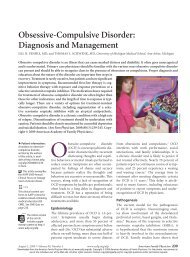- Page 2 and 3:
Health Informatics(formerly Compute
- Page 4 and 5:
Nancy M. Lorenzi Joan S. AshJonatha
- Page 6 and 7:
Robert T. Riley PhDJune 26, 1937-Ja
- Page 8 and 9:
Series PrefaceThis series is direct
- Page 10 and 11:
AcknowledgmentsMany thanks to all t
- Page 12 and 13:
xivContentsChapter 5Managing Succes
- Page 14 and 15:
xviContentsSECTION VI ORGANIZATIONA
- Page 16 and 17:
xviiiContributorsChristopher MoreyS
- Page 18 and 19:
Section ICase Studies in Technologi
- Page 20 and 21:
Introduction 3and informatics stude
- Page 22 and 23:
Introduction 5Leaders have differen
- Page 24 and 25:
1GEMINI: The Life and Times of aCli
- Page 26 and 27:
1. GEMINI: The Life and Times of a
- Page 28 and 29:
1. GEMINI: The Life and Times of a
- Page 30 and 31:
1. GEMINI: The Life and Times of a
- Page 32 and 33:
Section IIOrganizational ChangeIntr
- Page 34 and 35:
Introduction 17The Magnificent Seve
- Page 36 and 37:
Introduction 19reducing barriers to
- Page 38 and 39:
2The Web Center: A Case Study inStr
- Page 40 and 41:
2. The Web Center: A Case Study in
- Page 42 and 43:
2. The Web Center: A Case Study in
- Page 44 and 45:
2. The Web Center: A Case Study in
- Page 46 and 47:
2. The Web Center: A Case Study in
- Page 48 and 49:
2. The Web Center: A Case Study in
- Page 50 and 51:
2. The Web Center: A Case Study in
- Page 52 and 53:
3. Computers for Kids: Not All Fun
- Page 54 and 55:
3. Computers for Kids: Not All Fun
- Page 56 and 57:
3. Computers for Kids: Not All Fun
- Page 58 and 59:
3. Computers for Kids: Not All Fun
- Page 60 and 61:
4Managing ChangeJonathan Becker,Roy
- Page 62 and 63:
4. Managing Change 45Because of the
- Page 64 and 65:
4. Managing Change 47result, the st
- Page 66 and 67:
5Managing Success: An InformationSy
- Page 68 and 69:
5. Managing Success: An Information
- Page 70 and 71:
5. Managing Success: An Information
- Page 72 and 73:
IntroductionJonathan EinbinderIn he
- Page 74 and 75:
58 Section III. ImplementationWhat
- Page 76 and 77:
60 Section III. ImplementationHow D
- Page 78 and 79:
62 Section III. Implementationflow,
- Page 80 and 81:
6Bar Coding: It’s Hard to Kill a
- Page 82 and 83:
6. Bar Coding: It’s Hard to Kill
- Page 84 and 85:
7Developing an EmergencyDepartment
- Page 86 and 87:
7. Developing an Emergency Departme
- Page 88 and 89:
7. Developing an Emergency Departme
- Page 90 and 91:
7. Developing an Emergency Departme
- Page 92 and 93:
7. Developing an Emergency Departme
- Page 94 and 95:
7. Developing an Emergency Departme
- Page 96 and 97:
8Implementation of OpChart in WestM
- Page 98 and 99:
8. Implementation of OpChart in Wes
- Page 100 and 101:
8. Implementation of OpChart in Wes
- Page 102 and 103:
8. Implementation of OpChart in Wes
- Page 104 and 105:
8. Implementation of OpChart in Wes
- Page 106 and 107:
8. Implementation of OpChart in Wes
- Page 108 and 109:
9. Development of the Scientific Co
- Page 110 and 111:
9. Development of the Scientific Co
- Page 112 and 113:
9. Development of the Scientific Co
- Page 114 and 115:
9. Development of the Scientific Co
- Page 116 and 117:
10Early Implementation Problems ofa
- Page 118 and 119:
10. Early Implementation Problems o
- Page 120 and 121:
10. Early Implementation Problems o
- Page 122 and 123:
10. Early Implementation Problems o
- Page 124 and 125:
10. Early Implementation Problems o
- Page 126 and 127:
10. Early Implementation Problems o
- Page 128 and 129:
10. Early Implementation Problems o
- Page 130 and 131:
11. Implementation of a Web-Based I
- Page 132 and 133:
11. Implementation of a Web-Based I
- Page 134 and 135:
11. Implementation of a Web-Based I
- Page 136 and 137:
12Managing Change: Analysis of aHyp
- Page 138 and 139:
12. Managing Change: Analysis of a
- Page 140 and 141:
Comment by James G. AndersonAssessi
- Page 142 and 143:
12. Managing Change: Analysis of a
- Page 144 and 145:
12. Managing Change: Analysis of a
- Page 146 and 147:
12. Managing Change: Analysis of a
- Page 148 and 149:
12. Managing Change: Analysis of a
- Page 150 and 151:
Section IVEconomicsIntroduction . .
- Page 152 and 153:
Weak Accounting SystemsIntroduction
- Page 154 and 155:
Introduction 139often overran estim
- Page 156 and 157:
Introduction 141TABLE IV.1. Example
- Page 158 and 159:
144 Section IV. EconomicsTABLE 13.1
- Page 160 and 161:
146 Section IV. EconomicsTABLE 13.2
- Page 162 and 163:
148 Section IV. Economicsfor an ove
- Page 164 and 165:
14Catch 22: The Case of Utilization
- Page 166 and 167:
152 Section IV. Economicslonger or
- Page 168 and 169:
154 Section IV. EconomicsFor a new
- Page 170 and 171:
156 Section IV. Economics7 minStart
- Page 172 and 173:
158 Section IV. Economicswork lists
- Page 174 and 175:
15Antimicrobial Utilization Program
- Page 176 and 177:
162 Section IV. Economicspharmacy.
- Page 178 and 179:
164 Section IV. Economicsdifficult.
- Page 180 and 181:
166 Section IV. Economicsone area,
- Page 182 and 183:
168 Section IV. EconomicsAccording
- Page 184 and 185:
16Central Medical Healthcare System
- Page 186 and 187:
172 Section IV. Economicsimproves p
- Page 188 and 189:
17Building Consensus: QualityImprov
- Page 190 and 191:
176 Section IV. Economicsstaff time
- Page 192 and 193:
178 Section IV. Economicsing progra
- Page 194 and 195:
180 Section IV. Economics2. What pa
- Page 196 and 197:
182 Section IV. EconomicsThis appro
- Page 198 and 199:
184 Section IV. EconomicsCITC shoul
- Page 200 and 201: Section VLeadershipIntroduction . .
- Page 202 and 203: Introduction 189According to resear
- Page 204 and 205: 18Strategic Informatics: Planning f
- Page 206 and 207: OptionsOption 118. Strategic Inform
- Page 208 and 209: 18. Strategic Informatics: Planning
- Page 210 and 211: 19Fix Pharmacy!Jim Carpenter,Tadaak
- Page 212 and 213: 20Showdown in the Heart of TexasRob
- Page 214 and 215: 20. Showdown in the Heart of Texas
- Page 216 and 217: 20. Showdown in the Heart of Texas
- Page 218 and 219: 20. Showdown in the Heart of Texas
- Page 220 and 221: 21Mission Valley Medical CenterPhys
- Page 222 and 223: 21. Mission Valley Medical Center P
- Page 224 and 225: 21. Mission Valley Medical Center P
- Page 226 and 227: 21. Mission Valley Medical Center P
- Page 228 and 229: 22. The DNA Donation Project 215dep
- Page 230 and 231: 22. The DNA Donation Project 217Que
- Page 232 and 233: 23. Who’s in Charge? 219• Conve
- Page 234 and 235: 23. Who’s in Charge? 221Questions
- Page 236 and 237: IntroductionWendy McPheeRecently I
- Page 238 and 239: 226 Section VI. Organizational and
- Page 240 and 241: 24The Chief Resident’s DilemmaSte
- Page 242 and 243: 24. The Chief Resident’s Dilemma
- Page 244 and 245: 25Death of a CommitteeRobert Hallid
- Page 246 and 247: 25. Death of a Committee 235staff s
- Page 248 and 249: 25. Death of a Committee 237While t
- Page 252 and 253: 26. Whose Job Is It Anyway? 241have
- Page 254 and 255: 27. All for the Want of a Plan ...
- Page 256 and 257: 27. All for the Want of a Plan ...
- Page 258 and 259: 28. Fail to Plan, Plan to Fail 247o
- Page 260 and 261: 28. Fail to Plan, Plan to Fail 249v
- Page 262 and 263: 29. Founding Fathers Health Corpora
- Page 264 and 265: 29. Founding Fathers Health Corpora
- Page 266 and 267: Conclusion29. Founding Fathers Heal
- Page 268 and 269: 258 IndexChange management, (cont.)
- Page 270 and 271: 260 IndexHaustus, F., 171-173Hays,
- Page 272 and 273: 262 IndexOObservation patients, 152
- Page 274 and 275: 264 IndexVesalius Health System (VH
- Page 276: Cancer InformaticsEssential Technol











